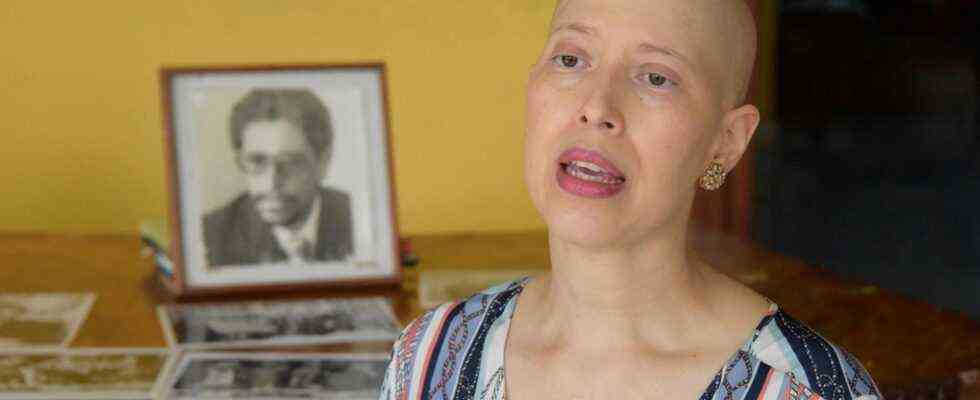Status: 06/26/2021 11:25 a.m.
First her father, once a high-ranking government politician, was arrested, then the police also came to see Cristian Tinoco. President Ortega is using all means to intimidate Nicaragua’s opposition. Only a few still dare to speak.
From Xenia Böttcher,
ARD studio Mexico City
Actually, the interview had already been promised, the shoot was supposed to take place in the morning. But that night the rejection comes: “Please forgive me, but I am afraid of putting my family, especially my father, in danger.” It is Cristian Tinoco, daughter of Victor Hugo Tinoco, former member of the government of President Daniel Ortega, who was among at least 15 opposition activists arrested this month.
Tinoco probably anticipated his arrest because he recorded a video in case he went missing: “If you see this video, it is because I was arrested by the Ortegas police. I want to assure you that our fight will continue to make it into Giving our country a democracy with free elections, because that is our right, “he says in it.
His daughter Cristian has cancer. And worries about her father are dwindling her strength, she says. She has not known anything about him for three weeks. She goes to prison three times a day. But there is no information. They are only allowed to hand over water to the police, nothing more. “He was illegally arrested, they just took him away. They didn’t even have an arrest warrant,” she says.
Cristian Tinoco, daughter of ex-foreign minister and presidential candidate Victor Hugo Tinoco, shows a picture of her father sitting with current president Daniel Ortega.
Image: dpa
Ortega’s opponents arrested and under house arrest
Several days after the arrest, she heard violent beating at the garden gate. Dozens of heavily armed police rushed to the opening. In great fear, Cristian broadcast a live video: “We are only women, we are unarmed. Help, we ask the media, come! We need help!”
The police broke into the house in black riot gear, took a laptop, documents and her father’s passport with them. The spook was over quickly. But fear is eating away at her soul. “I sleep badly and wake up at night for fear of when they will come back with which excuse,” she says.
As is the case with Cristian Tinoco, many opposition families are currently doing well. Presidential elections are due to take place in Nicaragua in November. Ortega, who is running again at the age of 75, does not want to give up his power. The possibility of free and fair elections is thwarted more openly than ever: his five most promising opponents in the presidential election have been arrested or placed under house arrest in the past few days.
“They prevent us from doing our job”
This was made possible above all with the help of legislative packages that Ortega’s Sandinista Party passed, the contents of which can be summarized under the headings of terrorism, money laundering and treason. Anyone who accepts money from abroad in any form, including through foundations, is currently the target of these laws – if they belong to the opposition.
The journalist Alfonso Flores is one of the few who still dares to speak to foreign journalists about the situation.
Image: ARD Studio Mexico City
Journalists too have to fear repression. For interview requests from ARD Studios Mexico City it hails initially cancel. “The government is not interested in the world knowing what is happening in Nicaragua. This state of lawlessness, of permanent oppression,” says Alfonso Flores. He is a correspondent for foreign media and one of the few who dares to speak.
The threat comes from the police. They prevent us from doing our job. Sometimes they take our cameras from us, see what has been filmed and even delete the material.
UN Commissioner for Human Rights calls for release
Or they receive messages from strangers who threaten them with knowing their name, place of residence and family. Flores believes the goal is intimidation so that there is no reporting, especially not unlike the media that are loyal to the line.
The UN High Commissioner for Human Rights, Michelle Bachelet, speaks of a climate of fear. The crisis in Nicaragua has worsened in an alarming way. “Human rights are deteriorating rapidly and worryingly. This is reducing the likelihood that the people of Nicaragua will be able to exercise their political rights on November 7th,” she says.
Bachelet demands the release of the prisoners: “Their arrest was carried out under a dubious interpretation of the law and without sufficient evidence. With serious violations of the procedural rules.”
Ortega does not intend to heed the call: his government is arresting and prosecuting criminals who are planning a coup against him, he said in a speech.
UN Human Rights Commissioner Michelle Bachelet is calling for the Ortega government to release all prisoners – so far without any consequences.
Image: AFP
Once a popular hero, now soon to be a dictator himself?
It is an irony of history that Ortega, of all people, is leading Nicaragua straight in the direction of dictatorship. At the end of the 1970s, he and the left-wing Sandinista guerrilla drove the dictator Anastasio Somoza Debayle from power. Ortega became a folk hero. In Germany, too, he was revered by many as a freedom fighter. Ortega promised freedom of expression, equal opportunities, education and health for the poorest – and initially he acted accordingly.
He said goodbye to it long ago. He and his family control the police, the supreme electoral council, the supreme court, and parliament. And what cannot be achieved with laws according to Ortega’s gusto, is carried out by pro-government paramilitaries by suppressing all open protest with threats, beatings and armed violence.
With Cristian Tinoco, the intimidation didn’t last long. She gives interviews again. “I don’t want to die without seeing my father again,” she says. “I don’t want to die before my country is free.”

